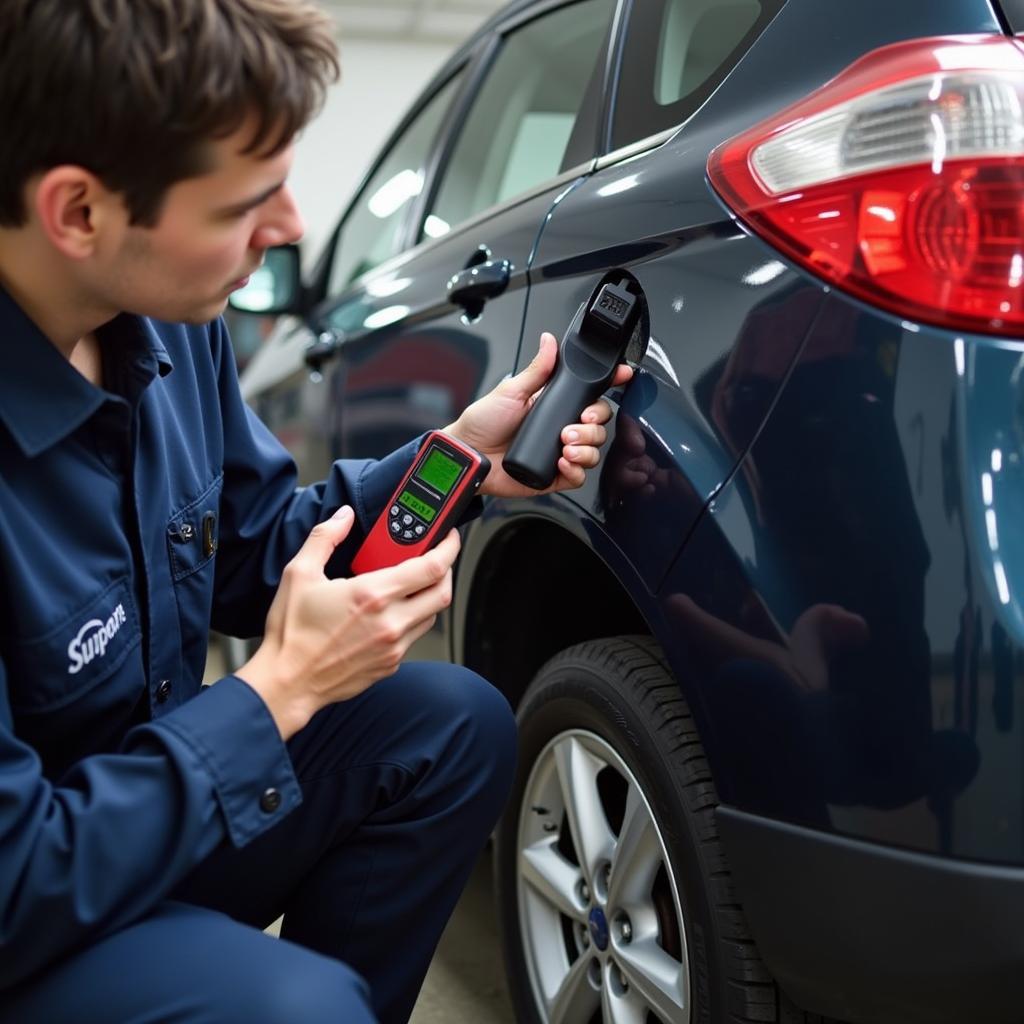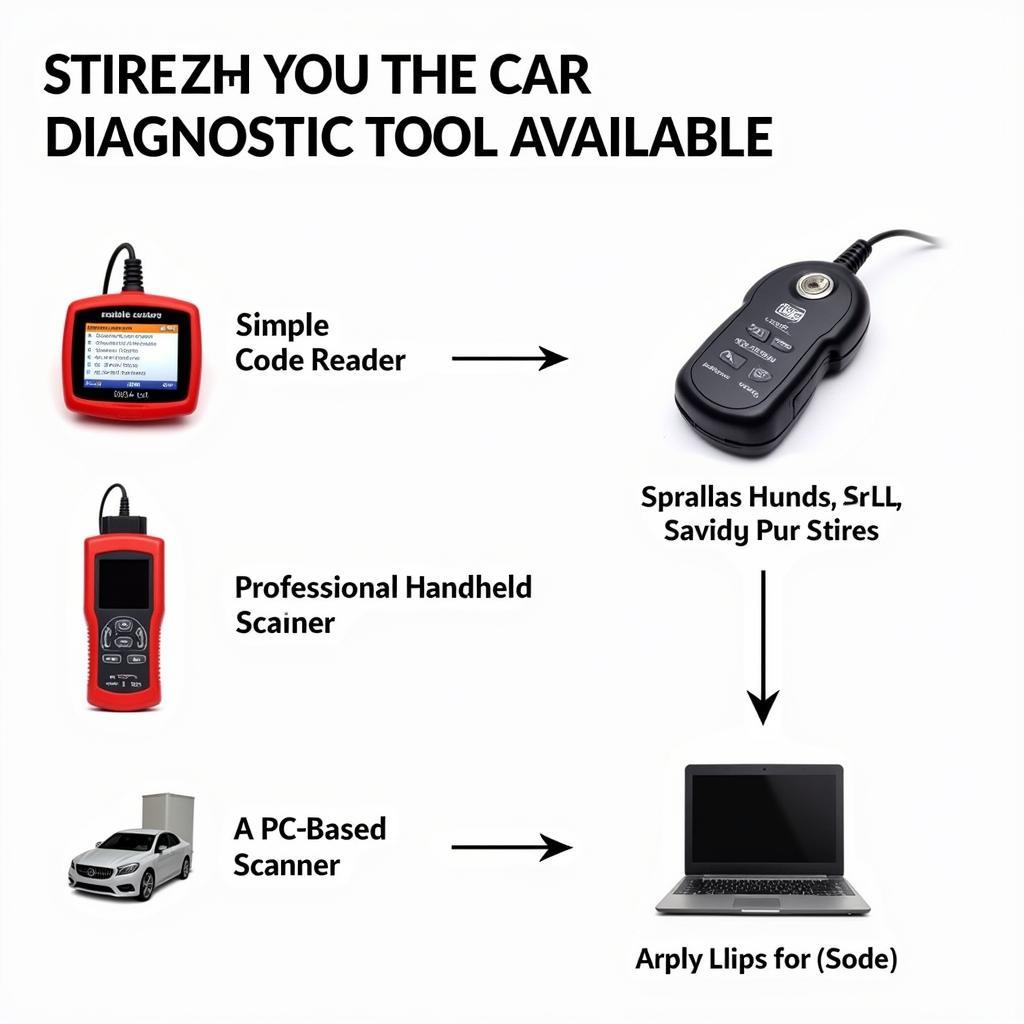Finding the best diagnostic tool for your car or truck can feel overwhelming with the sheer number of options available. Whether you’re a seasoned mechanic or a car enthusiast looking to DIY, having a reliable diagnostic tool can save you time, money, and unnecessary headaches. This article dives deep into the world of car and truck diagnostic tools, exploring the features, benefits, and top contenders to help you make an informed decision.
Understanding the Importance of a Good Diagnostic Tool
Modern vehicles are complex machines, relying heavily on sophisticated computer systems. When a problem arises, a diagnostic tool acts as your translator, deciphering those cryptic error codes and providing valuable insights into the issue.
 Mechanic using a diagnostic tool on a car
Mechanic using a diagnostic tool on a car
But it’s not just about reading codes. The best diagnostic tools empower you to:
- Pinpoint the root cause: Go beyond basic codes and delve into live data streams to identify the underlying cause of a problem.
- Save money on repairs: Avoid unnecessary trips to the mechanic by diagnosing issues yourself and understanding the true scope of the problem.
- Stay ahead of maintenance: Monitor your vehicle’s health, track maintenance schedules, and address minor issues before they escalate.
- Enhance your DIY skills: Become more confident in your ability to understand and maintain your vehicle.
Key Features to Consider
Not all diagnostic tools are created equal. Here’s what to look for:
- Vehicle Coverage: Ensure the tool is compatible with your car or truck’s make, model, and year. Some tools specialize in certain brands, while others offer broader coverage.
- Code Reading and Clearing: The tool should read and clear both generic (OBD-II) and manufacturer-specific codes.
- Live Data Streaming: Access real-time data from various sensors to monitor engine performance, transmission behavior, emissions systems, and more.
- Bi-Directional Controls: This feature allows you to perform active tests on components like actuators, solenoids, and relays to pinpoint faulty parts.
- Special Functions: Look for tools that offer advanced functions like ABS bleeding, airbag system resets, battery registration, and key programming.
- User Interface: Choose a tool with an intuitive interface, clear navigation, and easy-to-understand data presentation.
Types of Diagnostic Tools
The market offers a range of diagnostic tools to suit different needs and budgets:
- Basic Code Readers: Affordable and portable, these tools primarily read and clear basic OBD-II codes. Ideal for casual users.
- Bluetooth Scanners: Connect to your smartphone or tablet via Bluetooth, offering a cost-effective way to access more advanced features.
- Professional Handheld Scanners: These robust tools provide comprehensive functionality, extensive vehicle coverage, and often come with software updates.
- PC-Based Scanners: Connect to your computer, unlocking powerful diagnostic software with advanced data logging, graphing capabilities, and technical support.
 Various car diagnostic tools displayed on a workbench
Various car diagnostic tools displayed on a workbench
Top Diagnostic Tools for Cars and Trucks
1. (Example Brand) ProScan 5000:
- Ideal for: Professional mechanics and serious DIYers working on a wide range of vehicles.
- Key Features: Extensive vehicle coverage, bi-directional controls, special functions, live data graphing, and regular software updates.
2. (Example Brand) BlueDriver Pro:
- Ideal for: Car enthusiasts and DIYers looking for a powerful yet user-friendly Bluetooth scanner.
- Key Features: Comprehensive OBD-II coverage, live data streaming, repair reports, and compatibility with both Android and iOS devices.
3. (Example Brand) MaxiCheck MX808:
- Ideal for: Professional and home mechanics needing a balance of functionality and affordability.
- Key Features: Broad vehicle coverage, advanced coding capabilities, special functions for common maintenance tasks, and a user-friendly interface.
Note: The specific brands and models mentioned are for illustrative purposes only. The “best” tool will depend on your individual needs, budget, and the types of vehicles you work on.
Choosing the Right Tool for You
Consider these factors when making your decision:
- Frequency of use: Occasional users may find a basic code reader sufficient, while frequent DIYers will benefit from a more advanced scanner.
- Budget: Set a realistic budget and explore the features offered within your price range.
- Technical skills: Choose a tool with a user interface that aligns with your comfort level.
- Vehicle specifics: Ensure the tool is compatible with the make, model, and year of your vehicle, as well as any future vehicles you may own.
Conclusion
Investing in the best diagnostic tool for your car or truck is an investment in your vehicle’s health and your peace of mind. By understanding the features, types, and top contenders, you can make an informed decision that meets your specific needs and empowers you to take control of your vehicle’s maintenance.
Frequently Asked Questions (FAQs)
1. Do I need a diagnostic tool if my car has a check engine light?
Yes, a diagnostic tool is the only way to read the specific code triggering the check engine light and understand the underlying problem.
2. Can I use a diagnostic tool to program a new key?
Some advanced diagnostic tools offer key programming functionality, but it’s crucial to ensure the tool specifically supports your vehicle’s make and model.
3. Are there diagnostic tools specific to certain car brands?
Yes, some tools are designed for specific car brands and offer more in-depth functionality for those vehicles.
4. How often do diagnostic tools need updates?
Diagnostic tool manufacturers regularly release software updates to improve compatibility, add new features, and cover newer vehicle models.
5. Can I use a diagnostic tool on a diesel truck?
Yes, many diagnostic tools offer coverage for both gasoline and diesel engines. However, it’s essential to check compatibility with your specific truck’s make and model.
Need help finding the perfect diagnostic tool? Contact us via WhatsApp: +1(641)206-8880 or Email: [email protected]. Our 24/7 customer support team is here to assist you.

Leave a Reply